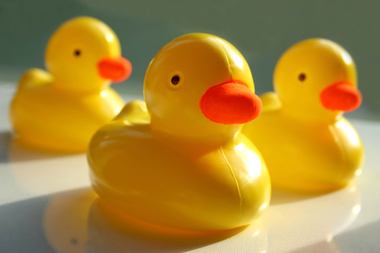Play It Again How Ragnar Kjartannson
⌄ Scroll down to continue ⌄

We all know that play is important for kids. Play teaches them coordination, adult roles, social interaction, and basic problem-solving skills. But somehow, we've fallen prey to the idea that play is only important for kids. "When I was a child, I spake as a child, I understood as a child, I thought as a child: but when I became a man, I put away childish things."
Bzzz! Wrong! Neener-neener-neener!
⌄ Scroll down to continue reading article ⌄
⌄ Scroll down to continue reading article ⌄
Play is important no matter what your age. Play is so important, in fact, that Dutch historian Johan Huizinga (1872-1945) once described it as the defining characteristic of our species. For Huizinga, humanity is notable not as Homo sapiens, "wise people", but Homo ludens, "playful people".
Play, What Is It Good For?!
Absolutely everything, as it turns out.
Of course play is good for our health. A lot of play involves exercise, which is a good thing in and of itself, but there's more to it than that. Play relieves stress, easing relaxation. Play releases a whole range of feel-good chemicals in the brain, which not only make play fun but relieves tension across the whole of our bodies. Feeling pressure? Get up and dance!
⌄ Scroll down to continue reading article ⌄
⌄ Scroll down to continue reading article ⌄
Play's good for our brains, too. Play lights up the entire right side of our brain like a barrel of Light Brites, creating a state of hyper-creativity that quite literally changes the way we see the world. In this mind-set, nothing is just what it seems – things take on new forms (is that an empty Red Bull can next to your trash can, or is it a marooned space capsule on the Lost Planet of Garbagania?), problems seem not just solvable but trivial (wrap a towel around your neck and fly over them!), and we feel empowered to take on the world. Dum dum DAAAAAHHHH!
Play unites our mind and bodies. In play, the gap between physical sensation and mental sensation is bridged – transforming random movements into acts of derring-do. See Charlie Brown raking leaves. Feel body hurtling through air. Sense whoosh of leaves scattering beneath your body. Hear old Chuck's plaintive "good grief!" It just feels good. Leave your detachment at home (praise the Great Pumpkin it's detachable!)
Play creates social bonds. There's evidence that the earliest social bonds we make – those between our infant selves and our parents – are primarily playful ones. The newborn infant doesn't encounter other people as people but just as extensions of self that are more-or-less reliable. As the infant develops a sense of its own identity and begins to recognize other people as beings with identities of their own, it begins to learn play and sociality at the same time. Enter mom or dad, leaning down and making googly-eyes at the smiling baby – bam! Sociality achieved.
⌄ Scroll down to continue reading article ⌄
⌄ Scroll down to continue reading article ⌄
That doesn't go away as we get older – play is still a rock-solid foundation for social behavior. It's why people who can't stand each other can bond over a company softball game or round of pick-up mud football in the park. Tomorrow might be back to the same old everyday loathing, but for today… (And maybe tomorrow will be different, after all!)
Can You Come Out and Play?
When's the last time you played? I mean, really played. Not just a half-hearted round of Minesweeper during a meeting, or a couple of Sudokus in a magazine at the dentist's office.
When's the last time you plopped yourself in front of a mirror, turned your eyelids inside out, stuck out your tongue, and made Chewbacca noises? The last time you grabbed your kid, threw her up in the air, and laughed with her in glee? (And hopefully you caught her on the way down!) Or chilled with family or friends over a board game? Or just went all wiggly all by your lonesome?
⌄ Scroll down to continue reading article ⌄
⌄ Scroll down to continue reading article ⌄
We get to feeling so darn serious, it's hard to play, to let ourselves play. You know your life has gone down an evil, evil path (the Dark Side is strong, but… well, it's Dark. Duh!) when playing makes you embarrassed. Even when you're alone.
I'd suggest you fix that.
Fortunately, there's an easy and proven effective remedy for play deprivation and seriousitis: go out and play! Come on, you know how! That's right, shake your booty, do a gold miner dance, flail your arms around your head like a squid-person, tell your secretary you love her but you're not a cannibal and interfaith relationships are so difficult – do something downright goofy. That's an order, soldier!
⌄ Scroll down to continue reading article ⌄
⌄ Scroll down to continue reading article ⌄
And here's the thing: spending some profoundly non-serious time with yourself or with others may well make you better at all that serious stuff that's been sucking at your soul and preventing you from playing in the first place. You'll feel better, be more relaxed, and enjoy more creativity – which unless you're a drill sergeant in a Vietnam-era coming of age story, can't help but make the rest of your life that much better.
See you out there!
Source: https://www.lifehack.org/articles/featured/go-out-and-play.html